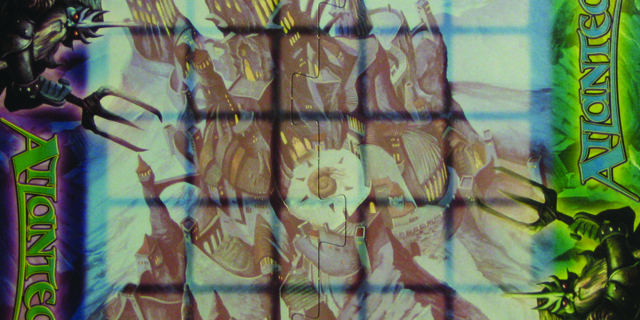
I have previously mentioned my taste for two-player abstract games. Sometimes these head-to-head strategic affairs are basic and themeless, but occasionally you can find solid abstract mechanics with unique coats of paint. Reiner Knizia’s Atlanteon is one of the unique ones. As a 2003 Fantasy Flight reissue of his 1992 design Revolution – not to be confused with the 2009 Steve Jackson title of the same name that I mentioned in my best-of column for that year and really should cover here one day – Atlanteon is a territorial tile-laying game that is easy to learn and quick to play. In its previous incarnation it was all about the French Revolution, but instead of Jacobians squaring off against Royalists in Paris, Atlanteon pits two warring tribe of merfolk against each other for control of Atlantis.
The board is a five-by-five grid of vacant squares. Each player has eleven numbered tiles, from zero through nine plus a king, and a supply of control markers. Players first take turns setting up the board by alternately placing the three tower tiles (and their respective markers), with the only rule here being that towers may not be orthogonally adjacent to each other. Once that has been done, the player who only placed one tower begins the game.
Each turn is a simple matter of selecting one of your reserve tiles and placing it on any open space. Once a placed tile has been surrounded by four other tiles (fewer if on an edge or corner), that tile is claimed by the player. Normal tiles are controlled by the player with the most influence over it, determined by adding up the values of each player’s surrounding tiles, with any bordering tower tiles not counting for either. In the event of a tie, the player who owns the tile in question wins. A controlled tile still exerts influence for its owner regardless of who actually controls the tile.

Controlling tiles is the primary path to victory. If a player’s king tile is ever controlled by the opponent, that player loses immediately. Otherwise, a player wins once they have control over 11 tiles, with the caveat that their king tile must be in play. The need to get the king out there in order to win adds to the tension of potentially losing the game if you place him poorly, so placing your king in a safe place (often one where he will be controlled by your own tiles immediately) is often a priority. It should also be noted that the king doesn’t exert any influence on surrounding tiles, just like your zero tile.
The only other way to win is to control all three towers, which works in one of two ways. The two white towers work similarly to the regular tiles, except that in the event of a tie, the player who did not play the most recent tile wins (i.e., the non-active player). The winning player claims the tower marker and places it in front of them, but no control marker is placed on the tower’s tile. The black tower, on the other hand, is awarded to the player with the least influence (with the same tiebreak), and the player who wins it also puts a control marker on its tile. Victory via towers is easy to prevent if you pay attention, but can ambush a careless player; it keeps the game focused on the entire board.
Since each player’s stock of reserve tiles is known information (even if it weren’t public information it would be easy to deduce from what’s been played), you know what moves your opponent has available at all times, and the reverse is true as well. Sacrifices must often be made, and you will probably have to play your low-value tiles eventually so choose wisely before they cost you some key territory.

A game of Atlanteon should rarely take longer than half an hour, and you can even expedite that a little by declaring some tiles and/or towers as being claimed before they are actually surrounded due to math and logic; for example: if I have three tiles exerting a total of ten influence on a tower, there is nothing you can place next to it that will prevent me from winning it, and the same holds true for decreasing totals as you play your higher-valued tiles elsewhere. I would only recommend this for experienced players, because you don’t want to go ahead with it and then find out you had miscounted or something. And that’s before you get into territory like calling a tile with only one other tile influencing it, which is easily possible if you can do the math.
While no longer in print, Atlanteon is a very basic game consisting of only a few cardboard tiles and wooden markers and doesn’t demand a high price even unopened. I think I picked up my copy for around five dollars, but it shouldn’t cost you more than 15 at the most. For a quick two-player thinker, that isn’t a bad deal, and you will probably get much more value out of it if you enjoy this type of game.



















